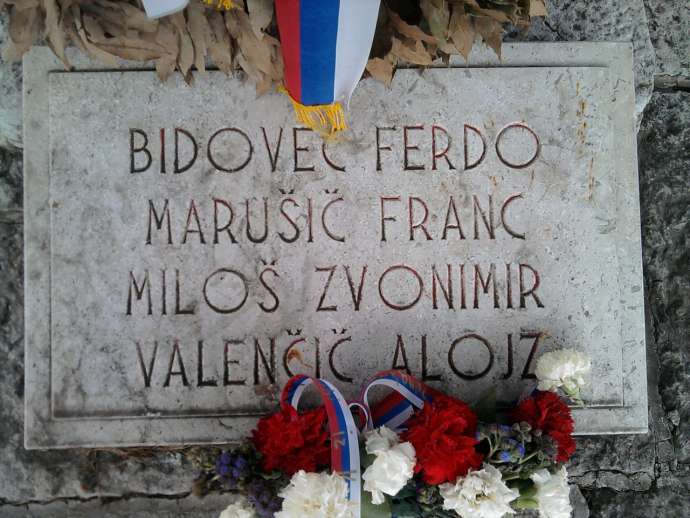STA, 6 September 2020 - Four victims of fascism, known among Slovenians as Basovizza Heroes, were remembered with a ceremony on Sunday at the site where they were executed 90 years ago following a short trial before a Fascist court in Trieste.
Slovenian patriots Ferdo Bidovec, Fran Marušič and Alojz Valenčič as well as Zvonimir Miloš, a Croat with close links to the Slovenian community in Trieste, were executed on 6 September 1930 in Basovizza common.
They were sentenced to death in what is known as the First Trieste Trial for an attack on the newspaper Il Popolo di Trieste. The other 12 defendants were sent to prison.
Tried under Fascist laws, the four are still formally "terrorists", something their relatives would like Italy to change, especially because the other Slovenian patriots and antifascists sentenced to death at the Second Trieste Trial in 1941 were posthumously rehabilitated.
The Slovenian ethnic minority in Italy cherishes the memory of Basovizza Heroes with annual commemorations, which are also often attended by Slovenian officials.
The victims of the first and second Trieste trials were also posthumously honoured with Slovenia's Golden Order of Freedom for their fight against Nazism and Fascism and for loyalty to Slovenian identity in the darkest times of Italianisation.
What is one of the highest state honours was bestowed on them in 1997, on the occasion of the 50th anniversary of the reunification of Primorska region with Slovenia.
In July, President Borut Pahor and Italian President Sergio Mattarella visited the Memorial to Basovizza Heroes alongside paying a visit to the Foiba of Basovizza, a karst pit which for Italians symbolises post-war summary killings by Partisans.
The move was seen by some as an act of reconciliation between the nations which had been on the opposite sides in the past, and as a revision of history by others.
Today's commemoration was addressed by Slovenian parliamentary Speaker Igor Zorčič, by Marija Bidovec, Ferdo Bidovec's niece, by Peter Močnik, a secretary of the SK Slovenian minority party, and by the head of the regional institute for the history of WWII resistance movement, Mauro Gialuz.
Addressing a sizeable gathering, Zorčič said the Basovizza Heroes had become a symbol of resistance to a murdering and oppressive regime and ideology that incited hatred and violence among people. They are heroes of the free Europe built on the foundations of anti-Fascism and resistance to all ideologies in the name of which people oppressed and killed each other.
The ceremony was attended by people from both sides of the border, including several senior officials, among them Minister for Slovenians Abroad Helena Jaklitsch, Slovenian Ambassador to Italy Tomaž Kunstelj, General Consul in Trieste Vojko Volk and Slovenian senator in Rome Tatjana Rojc.
In his address, Trieste Mayor Roberto Dipiazza said he did not deem the Basovizza Heroes terrorists. He mentioned Pahor's and Mattarella's joint visit to the Basovizza memorial and foiba and the symbolic return of Trieste Hall among the gestures that he said inspired hope for the future among the Slovenian and Italian communities.
Several other speakers noted the latest events as a new piece in the puzzle of reconciliation between the two nations and called for full rehabilitation of the Basovizza Heroes.
Later in the evening Archbishop of Ljubljana Stanislav Zore was to say mass at the local parish church, whereas Italian Senator Tatjana Rojc, a Slovenian minority member, delivered a speech.
The four patriots were also remembered in Slovenia with two commemorations on Friday, one in front of the University of Ljubljana and the other at the memorial to Basovizza Heroes in Kranj.
Historian Štefan Čok spoke about the values and message of Basovizza on Saturday at the memorial in Basovizza, and a number of events are planned for next week.
One of the highlights will be the presentation of Milan Pahor's book about Borba, an underground organisation whose members the four Basovizza victims were.







